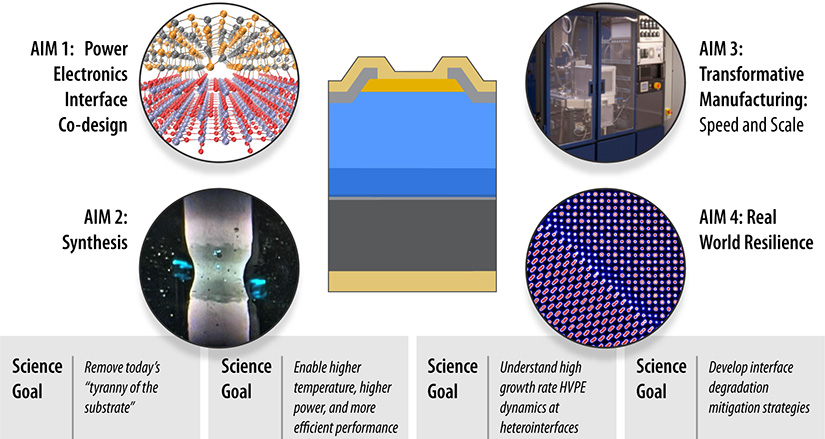Innovative Materials and Scalable Manufacturing Pathways: New NREL Research Center To Look Toward the Future of Renewable Energy

The U.S. Department of Energy (DOE) Office of Science's Basic Energy Sciences program recently selected the National Renewable Energy Laboratory (NREL) to lead A Center for Power Electronics Materials and Manufacturing Exploration (APEX), a new Energy Frontier Research Center (EFRC).
APEX joins 10 EFRCs across nine states receiving a share of $118 million in funding to advance fundamental energy research in the areas of advanced microelectronics, manufacturing science, quantum information science, and environmental management. EFRCs are research programs that bring together multidisciplinary, multi-institutional teams to advance urgent energy science.
APEX will enable expanded materials selection and integration for next-generation power electronics through novel interface and substrate design, coupled with pathways to scalable, low-cost, high-speed manufacturing. APEX has been awarded $13.9 million for four years and joins 33 other existing EFRCs funded from DOE. APEX is a collaboration between NREL, Argonne National Laboratory, Morgan State University, Johns Hopkins University, the Colorado School of Mines, the University of Virginia, and Kyma Technologies.
APEX will conduct research to drive understanding and advanced manufacturing for potentially transformative materials that will be needed to efficiently power the grid of the future, electrify transportation, and enable industrial decarbonization. These applications will create substantial thermal and power loads for the power electronics at the heart of grid infrastructure, creating the need for new materials and innovative devices that can effectively handle such demands. Power electronics are critical to control and convert electrical power.
"We're excited to bring APEX to life and conduct foundational research into the creation of materials that will power major segments of the energy transformation," said NREL's Nancy Haegel, senior research advisor and APEX director. "APEX has a great team, composed of an interdisciplinary community of scientists driven by the greatest energy challenge of our time: the urgent need to innovate our way to a highly electrified, sustainable, and clean energy ecosystem."
APEX will expand the range of materials choices for substrates, ultrawide-bandgap (UWBG) semiconductors, contacts, thermal sinks, and critical interfacial layers while advancing the fundamental understanding of properties at key interfaces between different materials.
"Our materials focus will be borides, nitrides, carbides, and/or oxides, which hold potential to enable the design of next-generation devices that are smaller and can handle more current," Haegel said. "We need the materials, the devices, the manufacturing, and the larger system to evolve together to support the energy transformation. APEX will take a 'codesign' approach, which means that we bring all these challenges together to inform our research from day one."
Morgan State University's Michael Spencer is an expert in power electronics devices and materials and will be the deputy director of APEX.
"Morgan State is excited to be part of APEX research," Spencer said. "Outcomes from APEX will impact future electrical power systems allowing the nation to better address the seminal issues of climate change, sustainability, and security."
The Basic Energy Sciences program supports basic science research that can open pathways to new energy technologies and to advanced DOE's mission in energy, environment, and national security. APEX has come about as a result of that commitment to transforming energy.
"Our team is excited that APEX will have the opportunity to explore exciting potential avenues to power future energy systems through better materials and more efficient manufacturing," Haegel said. "APEX brings a wealth of expertise in physics, materials, crystal growth, and power electronics devices from across the country to this effort."
Learn more about NREL's Basic Energy Sciences work.
Last Updated May 28, 2025
